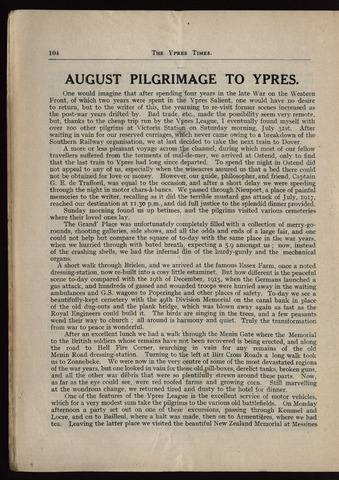AUGUST PILGRIMAGE TO YPRES.
104
The Ypres Times.
One would imagine that after spending four years in the late War on the Western
Front, of which two years were spent in the Ypres Salient, one would have no desire
to return, but to the writer of this, the yearning to re-visit former scenes increased as
the post-war years drifted by. Bad trade, etc., made the possibility seem very remote,
but, thanks to the cheap trip run by the Ypres League, I eventually found myself with
over loo other pilgrims at Victoria Station on Saturday morning, July 31st. After
waiting in vain for our reserved carriages, which never came owing to a breakdown of the
Southern Railway organisation, we at last decided to take the next train to Dover.
A more or less pleasant voyage across the channel, during which most of our fellow
travellers suffered from the torments of mal-de-mer, we arrived at Ostend, only to find
that the last train to Ypres had long since departed. To spend the night in Ostend did
not appeal to any of us, especially when the wiseacres assured us that a bed there could
not be obtained for love or money. However, our guide, philosopher, and friend. Captain
G. E. de Trafford, was equal to the occasion, and after a short delay we were speeding
through the night in motor chars-a-banes. We passed through Nieuport, a place of painful
memories to the writer, recalling as it did the terrible mustard gas attack of July, 1917,
reached our destination at 11.30 p.m., and did full justice to the splendid dinner provided.
Sunday morning found us up betimes, and the pilgrims visited various cemeteries
where their loved ones lay.
The Grand' Place was unfortunately completely filled with a collection of merry-go-
rounds, shooting galleries, side shows, and all the odds and ends of a large fair, and one
could not help but compare the square of to-day with the same place in the war years,
when we hurried through with bated breath, expecting a 5.9 amongst us now, instead
of the crashing shells, we had the infernal din of the hurdy-gurdy and the mechanical
organs.
A short walk through Brielen, and we arrived at the famous Essex Farm, once a noted
dressing-station, now re-built into a cosy little estaminet. But how different is the peaceful
scene to-day compared with the 19th of December, 1915, when the Germans launched a
gas attack, and hundreds of gassed and wounded troops were hurried away in the waiting
ambulances and G.S. wagons to Poperinghe and other places of safety. To-day we see a
beautifully-kept cemetery with the 49th Division Memorial on the canal bank in place
of the old dug-outs and the plank bridge, which was blown away again as fast as the
Royal Engineers could build it. The birds are singing in the trees, and a few peasants
wend their way to church all around is harmony and quiet. Truly the transformation
from war to peace is wonderful.
After an excellent lunch we had a walk through the Menin Gate where the Memorial
to the British soldiers whose remains have not been recovered is being erected, and along
the road to Hell Fire Comer, searching in vain for any remains of the old
Menin Road dressing-station. Turning to the left at Birr Cross Roads a long walk took
us to Zonnebeke. We were now in the very centre of some of the most devastated regions
of the war years, but one looked in vain for those old pill-boxes, derelict tanks, broken guns,
and all the other war debris that were so plentifully strewn around these parts. Now,
as far as the eye could see, were red roofed farms and growing corn. Still marvelling
at the wondrous change, we returned tired and dusty to the hotel for dinner.
One of the features of the Ypres League is the excellent service of motor vehicles,
which for a very modest sum take the pilgrims to the various old battlefields. On Monday
afternoon a party set out on one of these excursions, passing through Kemmel and
Locre, and on to Bailleul, where a halt was made, then on to Armentières, where we had
tea. Leaving the latter place we visited the beautiful New Zealand Memorial at Messines

